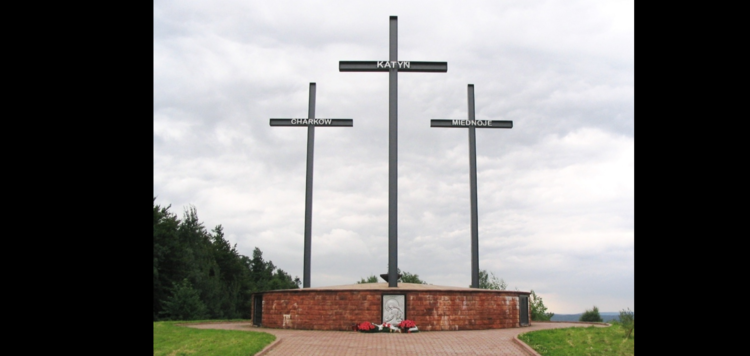


04/13/2010
The decapitation of the Polish government last weekend, including President Lech Kaczynski and the military leadership, on that flight to Smolensk to commemorate the Katyn Massacre, brings to mind the terrible and tragic days and deeds of what many yet call the Good War.
From Russian reports, the Polish pilot waved off four commands from air traffic control to divert to Moscow or Minsk. The airfield at Smolensk was fogged in. There is speculation that Kaczynski, fiercely nationalistic and distrustful of Russians, may have defiantly ordered his pilot to land, rather than delay the 70th anniversary of Katyn. The symbolism is inescapable.
For it was Polish defiance of Adolf Hitler’s demand to negotiate the return of Danzig, a German town put under Polish control after World War I, that gave birth to the Hitler-Stalin Pact, which led to Katyn.
After the German invasion on Sept. 1, 1939, ignited the war, Joseph Stalin attacked Poland from the east on Sept. 17, capturing much of the Polish officer corps.
In April 1940, on Stalin’s order, the Soviet Secret Police, the NKVD, murdered virtually the entire leadership of the nation, including 8,000 officers and near twice that number of intellectuals and civilian leaders. Some 4,000 were shot with their hands tied behind their backs in Katyn Forest.
The Germans unearthed the bodies in 1943 and invited the Red Cross in to examine the site. Through newspapers found on the corpses, the date of the atrocity was fixed as more than a year before the German Army invaded the Soviet Union.
When Polish patriots, whose sons had flown with the Royal Air Force in the Battle of Britain, went to Winston Churchill to demand that he get answers from Stalin about the atrocity, he brushed them off.
"There is no sense prowling around the three-year-old graves of Smolensk," said the Great Man.
At Stalin’s request, Churchill bullied the Poles into acceding to Soviet annexation of all the Polish land Stalin had been awarded for signing his pact with Hitler.
At the Nuremberg trials, the Russian delegation, led by Andrei Vishinsky, the prosecutor who did Stalin’s dirty work in the purge trials, charged the Germans with the massacre.
This presented a problem for the Americans and British who knew the truth. They finessed the issue by leaving the charge unresolved.
Before, during and after the Nuremberg trials that would convict the Nazis of "crimes against humanity," one of the greatest crimes against humanity in history was being committed. Fifteen million Germans — old men, women, children — were driven like cattle out of ancestral homes in Prussia, Pomerania, Brandenburg, Silesia and the Sudetenland.
As human rights champion Alfred de Zayas wrote in his courageous Nemesis at Potsdam: The Expulsion of the Germans From the East, perhaps 2 million died in the exodus. Few German women in Eastern Europe escaped rape.
The Allies turned a blind eye to the monstrous atrocity, as ancient names vanished. Memel became Klaipeda. Prussia disappeared. Koenigsberg, the city of Immanuel Kant, became Kaliningrad. Danzig became Gdansk. Breslau became Wroclaw.
"The Germans deserved it, for what they did," comes the retort.
Undeniably, the Nazi atrocities were numerous and horrible — against Poles, Ukrainians, Russians, Jews.
Yet, it was innocent Germans who paid for the crimes of the guilty Germans.
What happened in Eastern and Central Europe from 1939 to 1948 provided proof, if any more were really needed, of the truth of W.H. Auden’s insight in his poem "September 1, 1939": "Those to whom evil is done do evil in return."
At war’s end, Churchill and Harry Truman agreed to repatriate 2 million Soviet prisoners of war to Stalin, none of whom wished to go back. For return to Russia meant death at the railhead or a short brutal life at slave labor in the Gulag Archipelago.
Operation Keelhaul was the name given the Allied collusion with the Red Army in transferring these terrified POWs back to their deaths at the hands of the same Soviet butchers who had done the murdering at Katyn.
On Sept. 3, 1939, Britain and France declared war on Germany to restore the integrity and independence of Poland. For this great goal they converted a German-Polish clash that lasted three weeks — into a world war lasting six years.
And was Poland saved? No. Poland was crucified.
As a consequence of the war begun on her behalf, millions of Poles — Jews and Catholics alike — perished, the Katyn massacre was carried out, the Home Army was annihilated, the nation suffered five years of Nazi rule and almost half a century of communist persecution.
The tragedy of today is that it was men of the postwar generation, like Lech Kaczynski, who kept the faith of their fathers and led Poland out of that darkness into the sunlight of freedom, who died seeking to pay homage to their fathers who suffered one of the greatest crimes of that bloodiest of centuries.
COPYRIGHT CREATORS SYNDICATE, INC.
Patrick J. Buchanan needs no introduction to VDARE.com readers; his book State of Emergency: The Third World Invasion and Conquest of America, can be ordered from Amazon.com. His latest book is Churchill, Hitler, and "The Unnecessary War": How Britain Lost Its Empire and the West Lost the World, reviewed here by Paul Craig Roberts.